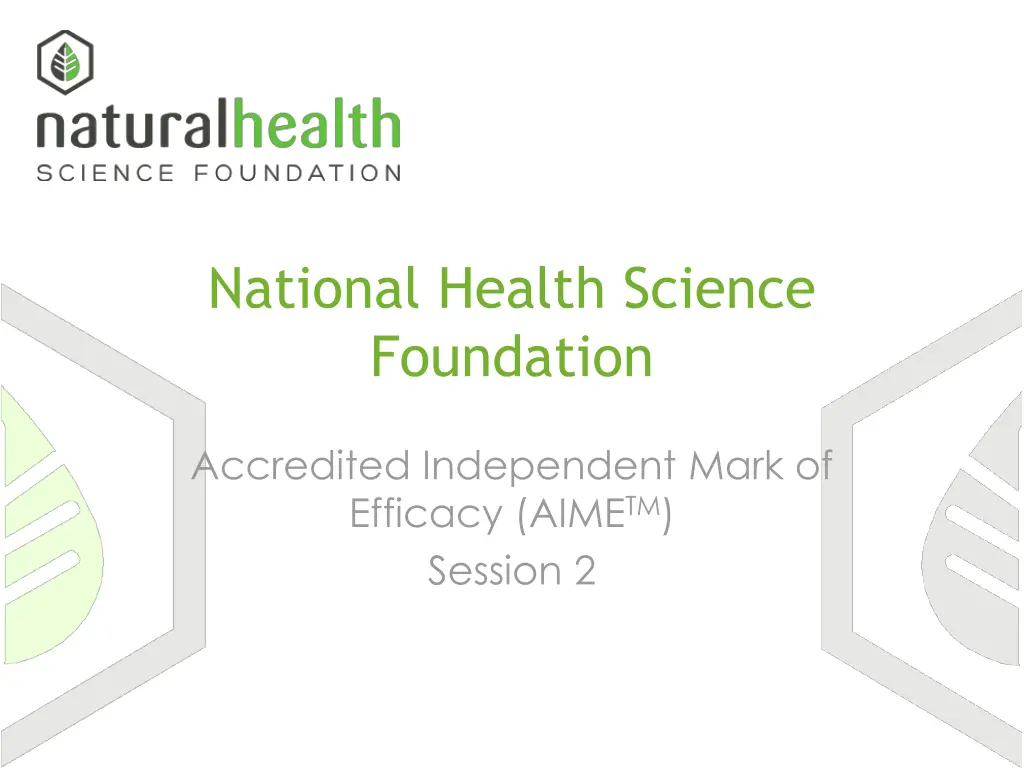
Independent Mark of Efficacy: AIME Service Overview
Discover the AIME Service, an independent review providing consumers with clarity on product claims supported by clinical evidence. The service, recognized by the National Health Science Foundation, aims to raise product standards and consumer awareness.
Download Presentation

Please find below an Image/Link to download the presentation.
The content on the website is provided AS IS for your information and personal use only. It may not be sold, licensed, or shared on other websites without obtaining consent from the author. If you encounter any issues during the download, it is possible that the publisher has removed the file from their server.
You are allowed to download the files provided on this website for personal or commercial use, subject to the condition that they are used lawfully. All files are the property of their respective owners.
The content on the website is provided AS IS for your information and personal use only. It may not be sold, licensed, or shared on other websites without obtaining consent from the author.
E N D
Presentation Transcript
National Health Science Foundation Accredited Independent Mark of Efficacy (AIMETM) Session 2
Many stakeholders believe in the need to provide an independent review of products to accredit those which have robust specific evidence to support them RATIONALE FOR RECOGNITION OF CLINICALLY PROVEN PRODUCTS
Options for Consumer Information Source Development by the NHSF Recommended
What is the AIME Service? It is an independent way of providing consumers with the ability to understand whether the clinical claims made for product they are buying has been supported by clinical evidence It provides both an on-pack logo and an online support mechanism There is a limited database of information about the product (containing basic product summary information, but not an extensive database) Application for inclusion is made by the company marketing the product (and in some cases by the ingredient manufacturer)and is controlled through a strict system linked through bar coding) The review of the application by an independent panel (the Clinical Advisory Board which is distinct from the Clinical Round Table) The service will be revenue neutral or revenue positive for the NHSF Both the NHSF and member companies will commit to the promotion of the Service to ensure it becomes recognised as a mark of product excellence The Panel will also be able to offer advice to companies with an interest in improving the quality of the their clinical trials with a view to improved chance of publication in preferred journals
Rationale The clear identification of the point of differentiation of the well developed products in the industry will provide a clear rationale for being a part of the organisation It will start to focus consumer awareness on the standard they should be seeking It will be self funding and provide funds to promote both the service and the organisation in its formative years It provides a visible means of highlighting product excellence and is a critical means of raising the bar for all players The detailed database solutions, either alone or with the ABC continue to be important but given the limited resources of the organisation the early efforts need to focus on the activities that will provide the widest interest. The next stage of database development should be considered at approximately Year 3-4of the organisations operational life Recommendation Initial
The Assessed Independent Mark of Efficacy HOW DOES IT WORK
What does the AIME Service Do and How does it Work On Pack Tick Administered by the NHSF Secretariat All product inclusion recommendations are completely at the discretion of the Independent Advisory Board The Advisory board is made up of Global experts in the development and assessment of clinical evidence Costs associated with the Advisory Committee are covered by the assessment fees The NHSF and Member Companies commit to the promotion of the Tick and the Clinical Trials Advisory service Denoting Levels of Evidence Facility to accommodate high Quality Ingredient Sources Equivalent Products ? TBC Clinical Trials Review Services Pre-Trial review service to assist companies to ensure that their trial design is robust and will provide a meaning answer to the question they are posing, and will meet the standard of well recognised peer reviewed journals Post trial review of results
Clinical Advisory Board The Clinical Advisory Board (CAB)is a group of 6 independent experts with global recognition in their area of specialty and with a proven track record in successful clinical trial development and assessment, a strong list of publications, and editorial experience on a range of peer reviewed clinical journals The role of the CAB is: To determine the criteria for product inclusion in the AIME Review all applications for product inclusion into the AIME and approve / reject and assign status Sign off on final documentation posted on the AIME CAB Chair to advise the CEO of key issues, opportunities for improvement and concerns pertaining to the AIME; and to provide advice to the Board as required The CAB Chair is not a member of the Board of Directors
Proposed CAB Membership Chair Professor John Funder AC MD BS PhD FRACP FRCP LLD (Hon Monash University), DMedSci (Hon University of Melbourne), MD (Hon. University of Sydney) Chair of NICM Advisory Board; Member of NICM Research Committee John Funder was President of the Australian Society for Medical Research (1979)and the Endocrine Society of Australia (1984), and (1996 2000) Chairman of the International Society for Endocrinology. In 1990 he resigned as a Senior Research Fellow of the National Health and Medical Research Council to become Director of the Baker Medical Research Institute (1990 2001). He is a Senior Fellow at Prince Henry's Institute of Medical Research at Monash Medical Centre, and a Professorial Fellow at the Centre for Neuroscience at the University of Melbourne. Having published over 500 scientific papers, Funder is an expert in mineralocorticoid receptors and aldosterone biology and serves as a consultant to many pharmaceutical companies engaged in this field. Dr. Gerry Bodeker researches and advises on international public policy on traditional (indigenous), complementary & alternative medicine and wellness. Having completed Doctoral studies at Harvard, he has held research and teaching appointments in the Division of Medical Sciences at Oxford University for two decades. Dr. Bodeker has been chair of the Commonwealth Working Group on Traditional & Complementary Medicine and done work on medicinal plant conservation for the World Bank, the Global Environment Facility, UNU, and the UN Food & Agriculture Organization. He is co-founder of the WHO-affiliated Research Initiative on Traditional Antimalarial Methods (RITAM). He has written extensively on traditional medicine and is editor-in-chief of the WHO Global Atlas on Traditional and Complementary Medicine and serves on the editorial boards of several journals. He has authored chapters in the Encyclopedia of Public Health (Elsevier 2008, 2017) on "The health of indigenous peoples" and on "Integrative medicine".. He is a Fellow of the International Union of Pure & Applied Chemistry
Proposed CAB Membership - Continued Sir Peter David Gluckman, ONZ, KNZM, FRS, FMedSci, FRSNZ is a New Zealand paediatrician. He is currently the inaugural Chief Science Advisor to the New Zealand Prime Minister. Associate Professor David Eisenberg - Associate Professor of Nutrition at Harvard T.H. Chan School of Public Health and Executive Vice President for Health Research and Education at the Samueli Institute.. From 2000-2010, Eisenberg served as the founding Director of the Osher Research Center at Harvard Medical School and the founding Chief of the Division for Research and Education in Complementary and Integrative Medical Therapies. He simultaneously served as the Director of the Program in Integrative Medicine at the Brigham & Women s Hospital. His current educational and research interests include: (1) studies to assess the safety, clinical, and cost effectiveness of complementary and integrative medical therapies; (2) the systematic evaluation of herbal medicines using state of the science technologies; and (3) novel multi-disciplinary strategies to optimize lifestyle and self-care behaviors (e.g., diet, exercise and stress management) to prevent, treat and manage common medical conditions. Eisenberg is a graduate of Harvard College and Harvard Medical School. He completed his fellowship training in general internal medicine and primary care and is Board Certified in Internal Medicine. Eisenberg has served as an advisor to the National Institutes of Health, the Food and Drug Administration, and the Federation of State Medical Boards with regard to complementary, alternative and integrative medicine research, education, and policy.
Proposed CAB Membership - Continued Salvador Ca igueral PhD, Professor of Pharmacognosy and Phytotherapy in the Faculty of Pharmacy of the University of Barcelona. His research deals with the chemistry and biological activity of medicinal plants.. His research also dealls with the development of methods for quality control of herbal preparations for medicines, dietary supplements, feed and cosmetics.He is widely published with over 100 research papers, 250 confernce contributions and editorship and contributions to many books. In addition, he is founder and scientific editor of the Spanish Revista de Fitoterapia and member of the editorial advisory board of the journal Planta Medica. He is full member of the Royal Academy of Pharmacy of Catalonia, founder member and President of the Spanish Society of Phytotherapy (Sociedad Espa ola de Fitoterapia, SEFIT), and member of the Board of the International Council for Medicinal and Aromatic Plants (ICMAP). He has also been member of the European Scientific Cooperative on Phytotherapy (ESCOP) (2003-2016) and the Board of Directors de la Society for Medicinal Plant Research (GA) (2004-2005), and the chairman of the 50th Annual Congress of the Society for Medicinal Plant Research (Barcelona, 2002). He has been the chairman (1997-2002) of the Phytotherapy group of the Spanish National Formulary and he is the chairman (1999-) of the Phytochemistry group of the Spanish Pharmacopoeia, as well as member of the Phytochemistry groups 13A (2005-) and 13B (1999-), as well the group on Extracts (2012-), of the European Pharmacopoeia. He is the current president (2011-) of the group 13A of the European Pharmacopoeia. Additionally, he is member of the essential oil committee of the Spanish Agency of Standardisation (AENOR) and the external expert panel of EMA (European Medicines Agency). Additional Expert to be identified
On-Pack Tick for Products with their own Clinical Trials but with only one promising trial and a commitment to an ongoing program Classification valid no longer than 2 years, at which time new data should be presented for reclassification Suited to start up companies with 1 0r 2 products Early stage of product development, on the market One RCT showing non-inferiority published in a peer reviewed journal Two or more RCTs published in well recognised peer reviewed journals showing consistent results
Tick Process for Ingredient Companies Ingredient Companies may wish to apply for Tick status for their specific ingredients if they have invested in clinical trials showing the effectiveness of their ingredient. They will follow the standard application process, but will receive an Ingredient Approval An ingredient approval does not provide automatic on-pack access Products using these ingredients will then be eligible for a simplified application process if they wish to reference the credentials of the ingredient Each Product that uses that ingredient must make a separate application to utilise the Tick on their packaging and to be listed on the database The Application for use of an ingredient tick is a simplified process that focuses on the product labelling, the formulation and the recommended dosing to ensure consistency with the original published studies The formulation must not include ingredients that were not present in the original studies If the Advisory Board deem that the use of the ingredient within the product is consistent with the original trials a Linked Master Number will be provided for on pack artwork and the bar code will be linked to the Master Number assigned to the ingredient in the database and the clinical information available will be consistent with that approved from the ingredient application
Tick Process for Ingredient Companies
Product Tick Review Process & Responsibilities
Tick Approval Marketed Products Tick Approval is Granted A Master Number is Generated and On-Pack logo with number is generated and pack artwork work with Logo is approved The Master Number is Linked to the Product Bar Code Database Entry Key Summary product data sheet is signed off by advisory committee and posted to website Bar-code Link takes consumers direct from pack to Database Entry via mobile phone Annual Renewal Renewal is processed, or if changes have occurred (eg new clinical data, formulation change etc) , a supplementary application may be required Renewal Form is sent out annually and companies advise of any changes to product or product information over the past year.
Cost Estimates for Clinical Advisory Board Total Cost $US Core Activity Guiding Assumptions and details Per diem $US2500.00 and 6 panel members Assume 1 face to face meeting per year, per diem of 3 days for all delegate, plus additional 2 days for chair (19 days) Assume 2 additional meetings with per diem average of 2 days per meeting including prep time. (The meeting is expected to be telecon of about 4 hours) (24 days); Plus 2 additional days through the year for added input by Chair (2 days) Total 45 days at $US 2500 Assume business class travel for all flights over 6 hours. Meetings will be held at the most economical location. This assumes a face to face meetings in US or Europe 2 x $10,000 -$15,000 fare from Southern Hemisphere 2 x $5,000 - $7,000 fares Plus economy fares for other delegates, staff, and any other adhoc travel required by the CAB during the year Accommodation, meals, meeting room costs, telecom charges, courriers and other administrative costs Clinical Advisory Board Honoraria $112,500 Air travel Clinical Advisory Board $60,000 Meeting Costs $40,000 Contingency For additional CAB input, etc $37,500 Total Allowance $250,000
Clinical Trials Advisory Service Pre- Trial Advice The Advisory Board will provide advice to Member companies on request to review proposed clinical protocols to ensure the best possible chance of meaningful results and publication in a respected journal. The service will be subject to quote, and will be based on the number of experts involved, and the amount of time required. It is a service to Member companies and will be priced on a cost recovery basis Post- Trial Advice The Advisory board will also offer the service of reviewing the analysis of clinical trials post trial to assist companies present their data in the most appropriate manner to achieve publication is a well rated journal Members of the Advisory Board are well experienced with publication in peer review journals and are regularly sought after as reviewers
Recommendations Recommendation 1: Proceed with the development of the concept of the AIME efficacy mark. Continue to monitor the need for and the optimal timing of the development of a broader Database solution with a target timing of year 3- year 4. Recommendation 2: Proceed with the appointment of the CAB and support the first meeting of the group to take place at the earliest convenience post appointment of the CEO.






















